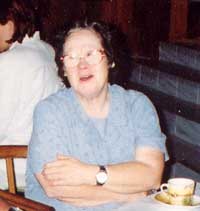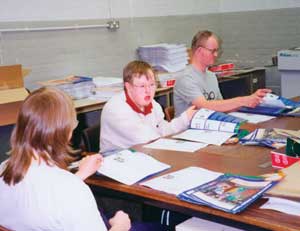Independence and employment for adults with Down syndrome
Provides an overview of the two following articles which discuss aspects of life for adults with Down syndrome. It highlights the importance of independent living skills, both at home and at work, for self-esteem and self-identity.
Buckley, S. (2002) Independence and employment for adults with Down syndrome. Down Syndrome News and Update, 2(2), 64-64. doi:10.3104/practice.168
The next two articles discuss aspects of life for adults with Down syndrome. The first, Meg's story, has been written by Meg's sister, Ann, and describes how Meg and the family coped after their mother's death. Two important themes come out in this story - the way in which Meg, at the age of 48 years, took more charge of her own life and developed new confidence and independence after her mother's death and the issues for brothers and sisters of adults with Down syndrome. Meg's mother had assumed that she would live with one of her sisters after her death and they were happy to arrange this but, in fact, Meg stayed in the family home as it became clear that, with support, this would be possible. While many adults with Down syndrome do move to independent living facilities before their parents die, more do not - they continue to live with parents because everyone feels this gives them the best quality of life or because a suitable alternative does not exist.

Meg Hooper
Meg's story may encourage families to plan for their family member with Down syndrome to stay in the family home, if suitable support can be organised. This could be on the lines of Meg's example - carers living in the house, or it could be achieved by inviting other adults with learning disabilities to share the accommodation, again with appropriate support available to them. In the UK national charities such as Mencap have schemes to enable this to happen but there is an issue about ownership of property to be considered, as schemes such as this may require the property to be transferred to the charity.
Meg's story reminded me of another story shared with me by a family member recently. After the death of her parents, she felt that she should take her brother with Down syndrome, a gentleman in his forties, into her home. Instead, she found him a place in a residential care facility but felt extremely anxious and guilty about this decision. She visited at all hours to check that he was OK but as the weeks went by, it became clear that he was really enjoying his privacy and independence and he made clear to his sister that he preferred his own home to living with her. He also gained new skills and became more independent. There is a message in here about the self-esteem and self-identity of adults and about how difficult it is for those of us who are parents to let go!

Adult workers at the charity
The second article describes the development of an adult employment scheme to encourage other employers to think of offering employment. While, in the UK, the disability benefit rules restrict the amount of money that can be earned, employment within these rules can still make a significant difference to the income of an adult with Down syndrome - it may double their weekly 'spending' money available for leisure activities, clothes and holidays. Some of the workers on this project opened their own bank accounts for the first time, all were very positive about joining the pay roll and one made clear he was now at work, just like his older brother. One of the staff already working in the organisation commented 'these employees with Down syndrome are far more competent at the work and far better behaved than teenage work experience trainees that I worked with in a previous job'.
Down Syndrome Education International is increasing its involvement in adult issues in several ways, with publishing and research projects. We would like to include contributions on adult issues relevant to adults with Down syndrome, their families and service providers in each issue of Down Syndrome News and Update so please send us in stories or reports of projects. It would be great if we could have contributions from individuals with Down syndrome and family members in each issue.
Editor

